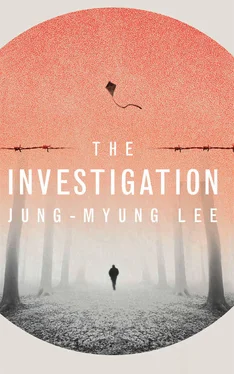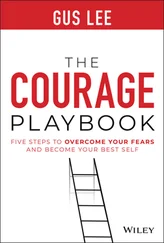Als riefen sie mir zu:
‘When will you be released?’
’30 November 1945. In 298 days.’
Applause broke the short silence. Professor Marui wiped away the sweat on his forehead. The applause continued. He bowed deeply and disappeared backstage. The unceasing applause brought him out again. Backstage, I closed my eyes.
The nurse attached the tube with skilful hands. The cold needle pricked Dong-ju’s arm and clear liquid entered his body. The singing and applause swelled and receded like the tide. Then a long silence ensued.
Onstage, the prisoners dragged their heavy shackles to line up. The audience looked tense. Midori, in her white nurse’s uniform, stepped onstage to a smattering of applause. She walked over to the piano and sat down. Blank eyes watched her. She drew in a deep breath and nodded, her fingers grazing the keys.
Dong-ju closed his eyes. His breathing was calm, but his mind was sluggish. It seemed as though he were submerged in deep water. He could hear the piano from far away. As the clear liquid slowly infused his bloodstream, the solemn, sad voices rushed into his ears:
Va, pensiero, sull’ali dorate;
va, ti posa sui clivi, sui colli,
ove olezzano tepide e molli
l’aure dolci del suolo natal!
Del Giordano le rive saluta,
di Sionne le torri atterrate.
Strong but sorrowful voices hurtled forward, shoving me aside. The sad beauty of the song made me wonder if I had the right to enjoy it. I was shaken awake by the joy for life. My heart heaved in turmoil; I was human, I was still alive.
O, mia patria, sì bella e perduta!
O, membranza, sì cara e fatal!
The song careened from tautness to softness, from speed to languidness, like a grand love-affair. The different notes and the varying timbres of each person’s voice melded together, howling sorrowfully and pounding majestically like a rainstorm. Midori pushed, suppressed and urged the voices on. They blended with the piano, then exploded in bliss:
Arpa d’or dei fatidici vati,
perché muta dal salice pendi?
Le memorie nel petto raccendi,
ci favella del tempo che fu!
O simile di Sòlima ai fati
traggi un suono di crudo lamento,
o t’ispiri il Signore un concento
che ne infonda al patire virtù.
The song ended, but the final chord remained ringing in the cold air. The last note dissipated, leading to a short silence. Dong-ju’s eyes were still closed as he held on to the lingering notes. The silence burst into thunderous applause and cheers. Dong-ju opened his eyes. His lashes were wet; he looked content, like a boy waking up from a happy dream. As the nurse pulled the needle out, the doctor exclaimed, ‘Good. You look more alert than usual.’
The following day Warden Hasegawa summoned me. Had he discovered my role in the underground library? Had he found out about the girl flying the kite? Frozen stiff, I perched on the chair the warden offered me. He held several newspapers aloft. The large letters danced in front of my eyes. Fukuoka Prison. Concert. Moving. Beautiful. ‘The concert was a huge success,’ he said, overcome with emotion. ‘Even the national press covered it! You contributed greatly by escorting the prisoners and watching over the rehearsals.’ He put the papers down and twisted the ends of his moustache. ‘By the way, you should know that Prisoner 331 was executed two days ago.’
Everything suddenly went dark.
‘Good job. You have successfully completed the investigation and resolved the murder.’
Choi was dead? I hadn’t even begun to figure out who the real killer was. I felt powerless. ‘Did he have any final words?’
‘No. He refused to say anything.’
‘Was his family notified?’
‘According to his file, he didn’t have any family. So I had no choice but to oversee the execution and then the burial.’
I nodded slowly.
Hasegawa thumped my slumped shoulders and congratulated me on a task well done, telling me that, as a reward, he would grant me leave in the spring. None of what he said registered. I left the warden’s office and walked mechanically down the long corridor of the administrative wing into the snow-covered yard. I felt that I was floating, as though the ground beneath my feet had collapsed. Choi’s death wasn’t an out-of-the-ordinary event at this prison, but I was racked with guilt. He shouldn’t have died. He’d risked his life to get out of this prison; his endless escape attempts and the resulting stints in solitary were the two true pillars that had supported his life. He was brought close to death, and yet he’d survived each time. But he’d failed to leave Fukuoka, even as a corpse.
I headed to the cemetery. I spotted a new marker inscribed with his number. I’d strung the noose around his neck. While I was lost in a maze, searching for the truth, he’d died alone. There was nothing I could do.
Or maybe, just maybe, there was something — I could find the man who had really killed Sugiyama.
WHAT IN THE WORLD HAPPENED?
Darkness fell over the frozen ground. The faint sounds of a piano could be heard outside the infirmary. The ivy snaking up the red-brick walls rustled in the wind. White frost nibbled at the edges of the clear window as warm light spilled into the darkness. Sitting at the piano, Midori was focused on the sheet music in front of her. She paused and turned round to look at me.
‘I want to see the charts of the patients who received treatment in the infirmary,’ I blurted out. ‘You see patients from Ward Three. You must oversee those records.’
‘I need a note from the head guard and to obtain permission from the head doctor.’
I paused. ‘Those records would help me figure out how Sugiyama died.’
Her forehead furrowed.
‘What do the charts have to do with the murder?’ she asked.
‘If I could see what he was involved in before he died, I’ll be able to find clues. Who he injured, when and how.’
‘The charts merely have simple entries about how the injury occurred and how it was treated. What could that possibly say about a murder?’
‘Records are living documents. Just as your sheet music becomes beautiful music, charts might be able to tell me more about Sugiyama’s life.’
Midori stared out the window for a long time. ‘Come back here at my next practice session.’ She turned back to the piano. Her beautiful music began once more.
Midori took out a black, hardcover file from in between her sheet music and handed it to me. As the sun set and left gold streaks across the keys, I started to read through the chart. From January to August, no Korean prisoner was treated. The mention of a Korean name was always followed by a note of the cause of death. Ward Three was lethal; at least three to four died every month. In January, a prisoner was sucked into the dye-baths and drowned, one fell to his death while repairing the ceiling and another died from a heart attack in his sleep. In February, two fell to their deaths, another suffered cardiac arrest and one suffocated. In the summer, incidents of aneurisms and heart attacks increased.
I noticed that at the end of August, the injured prisoners began to be treated. The number of Korean patients increased markedly in October. They were treated by the on-duty nurse, mostly for head injuries from falling during labour or slipping on stairs. The same prisoner names appeared repeatedly: Choi Chi-su, Kim Gwing-pil, Hiranuma Tochu. My eyes pricked. Choi and Dong-ju had received treatment once a month for head injuries and lacerations on their calves, shoulders, biceps and forearms. But the reasons for the injuries were different from what I knew to be true. I took the open file to Midori, who stopped playing.
Читать дальше












